He has been called the “greatest Irishman that ever lived” – most recently by the Irish broadcaster George Hook, who gave the key oration at the Béal na Bláth ceremony to mark the 92nd anniversary of Collins’ assassination. Few would argue that Collins is at the very least a leading candidate for that honour. His reputation is built on both the depth and breadth of his achievements.
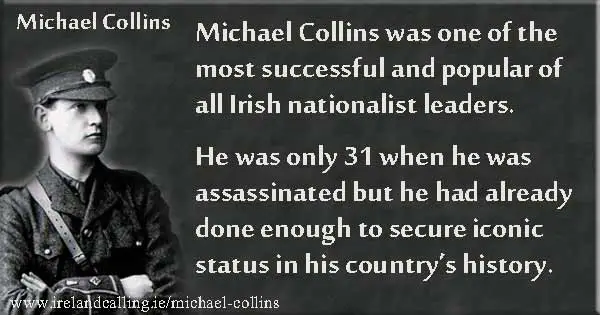
He was an important figure in the Easter Rising of 1916. He went on to mastermind military operations in the Irish War of Independence and then helped negotiate the treaty with the British that brought the Irish Free State into being. He was an elected member of the first Dáil Éireann, became Ireland’s Minister of Home Affairs and Minister of Finance. He also had the unwelcome task of leading operations against his former republican comrades in the Irish Civil War – a task he hated but was compelled to perform, and a task that would ultimately to lead to his assassination.
Childhood, early life and the ‘Big Fellah’
Michael Collins was born near Clonakilty in Co Cork in 1890. Most historians give his birth date as 16 October but his gravestone says 12 October. His father was a farmer who was 60 years old before getting married to Mary Anne O’Brien, who was just 23 at the time.
Despite the age difference, they had a happy marriage which produced eight children. Michael was the youngest of five girls and three boys. His sisters doted on him and it may be that it was during this time he got the title ‘The Big Fellah’ – given to him ironically as he was the smallest in the family yet constantly tried to do things beyond his years.
His father died when Collins was only six year old. Even then it seems the old man saw something special in his son because he told his children before he died: “One day he’ll be a great man. He’ll do great work for Ireland.” It was a prediction that was to come true in spectacular fashion.
Collins left school at the age of 15 and worked briefly for the Royal Mail before moving to London to work for a firm of stockbrokers. He lived with his sister and studied at King’s College, London in his spare time.
He maintained a passionate interest in the fight for Irish independence and returned to Ireland in 1915 to work for a firm of accountants in Dublin. By then he was already and active member of the Gaelic Athletic Association and the Irish Republican Brotherhood.
Collins was extremely intelligent with an incisive mind. He was both practical and ruthless and he rose quickly through the ranks of the IRB. He became an assistant to one of the organisers of the 1916 Easter Rising, Joseph Plunkett. Plunkett was later executed by the British for his part in the Rising. He was shot within hours of marrying his fiancé Grace Gifford in Kilmainham Jail.
The execution of Plunkett and the other leaders of the Rising led to a wave of anger from the Irish public, and their response may have helped to save Collins’ life. Shaken by the public reaction, the British halted the executions and Collins together with hundreds of other rebels was released from prison in the December of 1916.
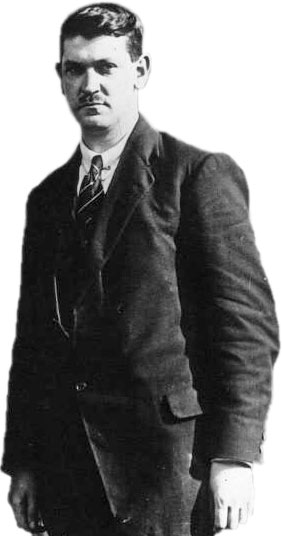
He then set about masterminding the Irish War of Independence. Collins was determined to avoid the mistakes of the Easter Rising. He realised that the Rising’s leaders like Pearse and Plunkett were idealists rather than soldiers. They had launched an attack that was naïve and bound to fail, as there was no way they could have gone toe to toe with the superior forces of the British Army.
Collins realised that a guerrilla form of warfare would be far more effective. He favoured surprise attacks on British spies and police stations, which would damage British intelligence gathering and undermine their authority and control.
By 1917, Collins’ military and political career were advancing hand in hand. He was Director of Organisaton for the Irish Volunteers, which had been formed by the IRB as a military force, and he was a member of the executive committee Sinn Féin, the party formed by Arthur Griffith to campaign for Irish independence.
In the British General Election of 1918, Collins was elected as Member of Parliament for Cork South as Sinn Féin won a landslide victory taking 73 of the 105 Irish seats. The Irish people had spoken through the ballot box and the nationalists now had a clear political and moral mandate for independence.
Rather than attend the British parliament in London, the Sinn Féin members set up their own assembly in Dublin, the Dáil Éireann.
Faced with stiff opposition to Home Rule by the Ulster Unionists, the British government stalled on independence as they tried to work out a compromise that would be acceptable to all sides. Dáil Eireann met for the first time on January 21. On the same day, a group of Irish Volunteers led by Dan Breen shot dead two members of the Royal Irish Constabulary.
It was the first action of the Irish War of Independence, which would be largely masterminded by Michael Collins.
Collins became Minister for Finance in the new Dáil and was successful in organising a bond which raised £400,000 to fund the new administration. At the same time, he was organising the Volunteers, now known as Irish Republican Army (IRA), which the Dáil had ratified as Ireland’s official national army.
Led by Collins, the IRA now tried to destabilise British rule and authority by attacking RIC barracks. Collins also set up an assassination unit known as The Squad, which would be responsible for eliminating British spies and informers.
The British responded by augmenting the RIC with a special task force made up largely of World War I veterans. There weren’t enough uniforms for them so they wore mixture of khaki army kit and dark police uniforms.
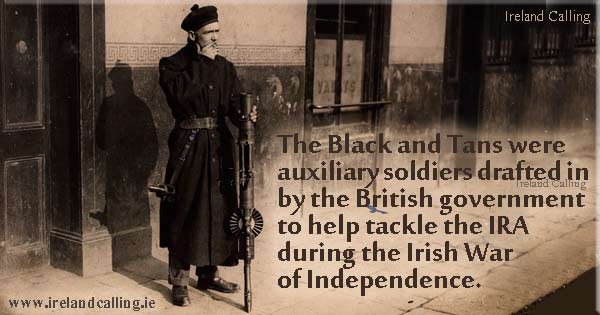
They became known as the Black and Tans and quickly developed a reputation for brutality and irrational behaviour. They were often out of control as they carried a series of attacks and atrocities. The IRA responded with equal ruthlessness.
The Bloody Sunday of 1920
On November 21, 1920, Collins sent his assassination squad to various addresses across Dublin where they shot dead a group of 13 spies working for the British.
The Black and Tans responded by opening fire later the same day at a Gaelic football match in Dublin’s Croke Park. Fourteen civilians including one of the players were killed. The killings outraged the public both in Ireland and in Britain, which each side outraged at the death of their own countrymen.
The events, however, were seen as a victory for Collins and the IRA. The assassinations had severely weakened the British intelligence effort, while the retaliatory killing of 14 innocent civilians had outraged public opinion across the world, particularly in America, and had undermined Britain’s moral authority to claim sovereignty over Ireland.
The Truce of 1921
By 1921, both sides had fought themselves to a stalemate. The British realised they could not defeat Collins and the IRA unless they invaded with full military force, imposed martial law and suspended normal civil liberties. They also realised that this would be seen as politically unacceptable across the world.
For its part, the IRA was virtually worn out and running short of ammunition and supplies. It suited both sides to call a truce, which was officially agreed on July 11.
All that remained was to negotiate a peace treaty; one that would satisfy the Irish demand for independence while allowing the British to save face, and more importantly, one that wouldn’t provoke an armed uprising by Ulster Protestants who were implacably opposed to being part of an independent Ireland.
In August, 1921, Éamonn de Valera was designated as President of the Irish Republic by the Dáil. De Valera was a skilled negotiator and would have been expected to have led the Irish delegation negotiating the Peace Treaty talks. Instead, he sent Collins with a team that also included Arthur Griffith.
Some historians have argued that this was a clever political sidestep by de Valera because he knew that any treaty would have to involve a compromise that would be unacceptable to hard line nationalists.
If that was his thinking then he was absolutely right. Collins didn’t want to go to London but agreed because he felt it was his duty and that “somebody had to do it”.
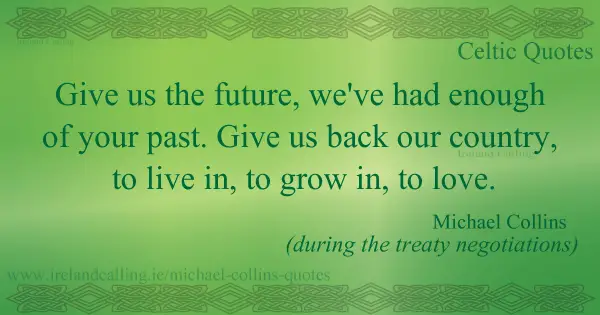
Negotiations lasted more than two months. The result was the Anglo-Irish Treaty signed by Collins and the negotiating team on 6 December 1921. It gave Ireland dominion status as the Irish Free State, along the Canada model. It would still be part of the British Empire and crucially, Dáil members would have to swear an oath of allegiance to the Crown.
Swearing an oath to the crown was repugnant to most nationalists. The treaty was seen as a fudge and sell-out by many, including de Valera. Collins had predicted the reaction and famously said that by signing the treaty, he had effectively signed his own death warrant.
Public opinion in Ireland split along the lines of those against the treaty and those who were reluctantly prepared to accept it.
The Dáil debated the treaty for 10 days before eventually ratifying it by 64 votes to 57.
De Valera voted against and then urged all the other opponents to withdraw from the Dáil. The IRA were also divided and the stage was becoming set for civil war.
The signing of the treaty was followed by sporadic armed conflict which saw former republican comrades pitted against each other. Collins now found himself fighting and plotting the downfall of his former friends and colleagues.
In the meantime, he set about writing the constitution of the new Irish Free State, much of which is still in force today.
The death of Michael Collins
The Irish Civil War rumbled on for the next year. By August 1922, the forces of the Irish Free State seemed to be getting the upper hand against the hard line republicans and controlled most of the country.
Nevertheless, the situation remained volatile and Collins was fully aware that he was a target for assassination. On 22 August 1922, he set off with some of his men from Cork city in the west of the county. He was advised against the journey but was said to have replied: “They won’t shoot me in my own county.”
He was wrong. His party was ambushed at a crossroads at the remote area of Béal na Bláth. What happened that day is unclear, but Collins was shot dead by a sniper’s bullet.
There was no formal inquiry into the death which, as many historians have pointed out, is both strange and suspicious given Collins’ high profile. Today, more than 90 years later, there still hasn’t been a formal inquiry and mystery still surrounds what happened that day.
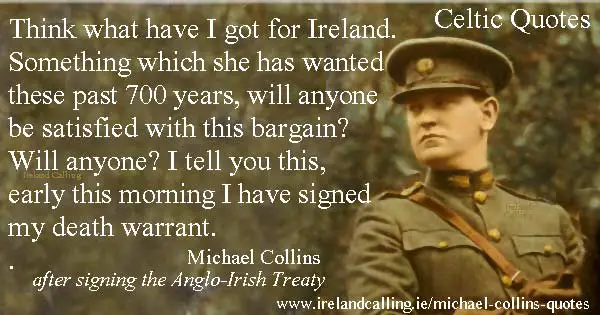
The legacy of Michael Collins
Michael Collins is widely regarded as one of Ireland’s greatest leaders, perhaps even the greatest. He had an extraordinary range of skills that could see him leading a military campaign one minute and organising complex financial transactions the next. He was both a diplomat and a soldier, a strong leader and a loyal servant to his country.
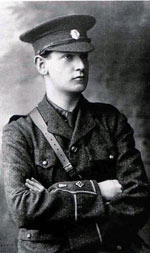
He played a leading role in gaining independence for Ireland. Although the Anglo-Irish Treaty didn’t give Ireland the full independence it wanted, it did provide as Collins argued “the freedom to achieve freedom”.
History was to prove him right as Ireland did eventually become a fully independent republic, albeit without the six counties in Ulster that chose to remain part of Great Britain.
As the 20th century moved on, the reputation of Michael Collins grew with each decade as people came to see the enormity of his contribution.
In 1966, his former colleague and sometimes opponent de Valera was reported as saying: “It is my considered opinion that in the fullness of time, history will record the greatness of Michael Collins; and it will be recorded at my expense.”
The life and achievements of Michael Collins are commemorated each year at the place of his untimely death, Béal na Bláth in Co Cork.
michael-collins.html